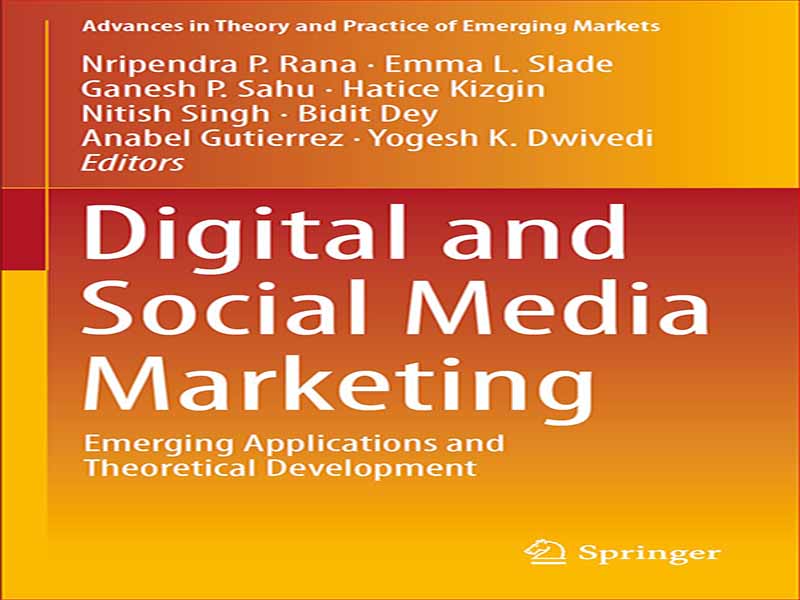- عنوان کتاب: Digital and Social Media Marketing
- نویسنده: Nripendra P. Rana
- حوزه: بازاریابی
- سال انتشار: 2020
- تعداد صفحه: 237
- زبان اصلی: انگلیسی
- نوع فایل: pdf
- حجم فایل: 6.82 مگابایت
ظهور سریع و پذیرش گسترده فناوریهای اطلاعات و ارتباطات (ICTs) و رسانههای دیجیتال و اجتماعی تأثیر قابلتوجهی بر نحوه برقراری ارتباط مردم و برآوردن نیازهای اجتماعی-اقتصادی، عاطفی و مادی خود دارد (Shareef et al. 2018; Shiau et al. 2017). ، 2018). فناوری اطلاعات و ارتباطات و رسانههای دیجیتال، مانند ایمیلها، موتورهای جستجو، گوشیهای هوشمند، وبسایتها و سایتهای رسانههای اجتماعی، در حال حاضر به طور گسترده توسط افراد برای طیف وسیعی از فعالیتها از جمله جستجوی اخبار روزانه و بهروزرسانیهای رویدادهای مهم استفاده میشوند. ارتباط با خانواده و دوستان؛ بررسی محصولات، خدمات و مکانها؛ خرید و فروش کالا؛ دسترسی به حمل و نقل، گردشگری و خدمات مالی شخصی؛ برقراری ارتباط و به اشتراک گذاری اطلاعات از طریق دهان به دهان الکترونیکی (eWOM)؛ و مدیریت محل کار (Alalwan et al. 2017; Algharabat et al., 2017, 2018; Arora et al. 2019; Hossain et al. 2019; Ismagilova et al. 2017, 2019a, b; Kamboj 18 et al. 2018، 2019 و همکارانش. علاوه بر این، افزایش رادیکال در دسترسی زمانی و جغرافیایی، مصرف کنندگان را برای اعمال نفوذ بر برندها، محصولات و خدمات توانمند می کند (الغرابات و همکاران 2019؛ پلوم و همکاران 2016). این فناوریها همچنین توسط کسبوکارها برای اهداف مختلف از جمله توزیع و فروش کالا، خردهفروشی خدمات مصرفکننده، مدیریت ارتباط با مشتری، و تأثیرگذاری بر رفتار مصرفکننده با بهکارگیری شیوههای بازاریابی دیجیتال مورد استفاده قرار میگیرند (Dwivedi et al. 2015، 2017؛ Kapoor et al. 2016). ، 2018; یانگ و همکاران 2017). پیشرفت تکنولوژی منجر به تکامل رفتار مصرف کننده از طریق “دگردیسی دیجیتال” شده است که منجر به شکل گیری “فرهنگ مصرف کننده دیجیتال” شده است، که منطقه ای بدیع و تا حد زیادی ناشناخته است که زمینه مساعدی را برای دانشگاهیان، محققان و متخصصان علاقه مند به درک این پدیده در حال آشکار شدن فراهم می کند. این کارگاه تحقیقاتی، همراه با جلد ویرایش شده توسط Springer Nature (با عنوان بازاریابی دیجیتال و رسانه های اجتماعی – کاربردهای نوظهور و توسعه نظری) و شماره ویژه مجله خرده فروشی و خدمات مصرف کننده، با هدف گردآوری رشته های مختلف و جامعه علمی انجام شده است. برای پیشرفت دانش در مورد تمرین و تحقیقات مرتبط با بازاریابی دیجیتال و رسانه های اجتماعی (آسوانی و همکاران 2018). برای دستیابی به این هدف، از مرور ادبیات سیستماتیک منجر به توسعه تئوری و مقالات تجربی با استفاده از روشهای کمی، کیفی و/یا انتقادی استقبال میشود. موارد ارسالی با تمرکز بر ساخت/توسعه تئوری خاص بازاریابی دیجیتال، توسعه و اعتبارسنجی اندازهگیری، و آزمایش تئوریها و مدلهای بازاریابی و سیستمهای اطلاعاتی موجود برای ارزیابی مناسب بودن آنها برای گسترش دانش در این حوزه دانشگاهی نوظهور مورد توجه قرار میگیرد. فراخوان مقالات ارسالی را در دو دسته اصلی درخواست کرد: مقالات تحقیقاتی کامل و مقالات کوتاه تحقیقاتی در حال انجام. هر ارسالی توسط حداقل دو دانشگاهی آگاه در این زمینه، در یک فرآیند بررسی دوسوکور بررسی شد. در مجموع 24 ارسال برای پذیرش نهایی و انتشار در نظر گرفته شد که شامل مواردی از کشورهای مختلف در سراسر جهان مانند بریتانیا، ایالات متحده آمریکا، کانادا، ایرلند، هند، اردن، هلند، عربستان سعودی، اسپانیا و غیره میشد. مقالات به چهار گروه تقسیم شدند که در زیر به هر یک از آنها اشاره شده است. مقالاتی که در قسمت اول ظاهر می شوند به موضوع بازاریابی رسانه های اجتماعی می پردازند. بر اساس بررسی ادبیات بازاریابی رسانههای اجتماعی، Lal، Ismagilova، Dwivedi، و Kwayu قصد دارند مروری بر بازگشت سرمایه در بازاریابی رسانههای اجتماعی با تمرکز خاص بر نتایج نامشهود مانند آگاهی از برند، تعامل/ارتباط با مشتری، و الکترونیکی ارائه دهند. دهان به دهان (eWOM). مطالعهای که توسط فرودی، نظریان و عزیز انجام شد، با هدف شناسایی عناصر و نتایج کلیدی وبلاگهای الکترونیکی مد و تأثیرات وبلاگهای الکترونیکی مد بر قصد زنان برای استفاده از آنها انجام شد. یک تحقیق مفهومی اکتشافی توسط الغرابات، رعنا، علالوان و باعبدالله، تأثیر ساختارهای تجارت رسانههای اجتماعی را بر اعتماد اجتماعی و ایجاد مشترک ارزش مشتری بررسی کرد. تحقیق اسد و عزی به بررسی تفاوت های جمعیت شناختی در مورد پذیرش تجارت اجتماعی توسط مصرف کنندگان در عربستان سعودی پرداخت. شارما، آنوجا و علوی ابزار تحقیقی را برای مطالعه تأثیر ادراک برند مصرف کننده، رابطه برند مصرف کننده و رفتار خرید مصرف کننده بر خرید پوشاک آنلاین ایجاد کردند. هدف تحقیق الزبیدی کمک به ادبیات بازاریابی از دیدگاه غیر غربی از طریق کاوش کیفی در مفاهیم مرتبط با رفتار طرفدار محیط زیست مصرف کنندگان در عربستان سعودی است. آخرین مقاله این بخش توسط قاسم، الغرابات، علالوان و حاجوی است که بر درک آنچه مشتریان در فرهنگ های جمعی را از استفاده از خدماتی مانند اجاره یا به اشتراک گذاشتن اقلام لباس با خرده فروشان باز می دارد، تمرکز دارد.
Rapid emergence and widespread adoption of Information and Communications Technologies (ICTs) and digital and social media is having a significant impact on the way people communicate and fulfill their socioeconomic, emotional, and material needs (Shareef et al. 2018; Shiau et al. 2017, 2018). ICTs and digital media, such as emails, search engines, smartphones, websites, and social media sites, are already being used widely by individuals for a range of activities including searching daily news and updates on critical events; connecting with family and friends; reviewing products, services, and places; selling and buying goods; accessing transportation, tourism, and personal financial services; communicating and sharing information through electronic word of mouth (eWOM); and workplace management (Alalwan et al. 2017; Algharabat et al., 2017, 2018; Arora et al. 2019; Hossain et al. 2019; Ismagilova et al. 2017, 2019a, b; Kamboj et al. 2018; Kapoor et al. 2018; Kaushik et al. 2018; Kizgin et al. 2018, 2019; Shareef et al. 2016a, b, 2017, 2019a, b; Singh et al. 2017). Furthermore, radical increase in both temporal and geographical reach is empowering consumers to exert influence on brands, products, and services (Algharabat et al. 2019; Plume et al. 2016). These technologies are also being harnessed by businesses for various purposes including distribution and selling of goods, retailing of consumer services, customer relationship management, and influencing consumer behavior by employing digital marketing practices (Dwivedi et al. 2015, 2017; Kapoor et al. 2016, 2018; Yang et al. 2017). Technological advancement has resulted in evolution of consumer behavior through “digital metamorphosis” leading to the formation of “digital consumer culture,” which is a novel and largely unexplored area presenting fertile ground for academics, researchers, and practitioners interested in understanding this unfolding phenomenon. This research workshop, along with the edited volume by Springer Nature (entitled Digital and Social Media Marketing—Emerging Applications and Theoretical Development) and special issue of the Journal of Retailing and Consumer Services, aims to bring together a variety of disciplines and a scholarly community for the advancement of knowledge regarding practice and research related to digital and social media marketing (Aswani et al. 2018). To achieve this goal, systematic literature reviews leading to theory development and empirical papers employing quantitative, qualitative, and/or critical methods are welcomed. Consideration will be given to submissions focusing on digital marketing-specific theory building/development, measurement development and validation, and testing of existing marketing and information systems theories and models for evaluating their suitability for extending knowledge in this emerging academic domain. The Call for Papers solicited submissions in two main categories: full research papers and short research-in-progress papers. Each submission was reviewed by at least two knowledgeable academics in the field, in a double-blind review process. A total of 24 submissions were considered for final acceptance and publication including those from various countries across the world such as the UK, the USA, Canada, Ireland, India, Jordan, the Netherlands, Saudi Arabia, Spain, etc. These final sets of papers were clustered into four groups, each of which is outlined below. The papers appearing in Part I address the theme of social media marketing. Based on the review of social media marketing literature, Lal, Ismagilova, Dwivedi, and Kwayu aim to provide a review of return on investment in social media marketing with a specific focus on intangible outcomes such as brand awareness, customer engagement/relationship, and electronic word of mouth (eWOM). A study by Foroudi, Nazarian, and Aziz aimed to identify the key elements and outcomes of fashion e-blogs and what effects fashion e-blogs have on women’s intention to use them. An exploratory conceptual research by Algharabat, Rana, Alalwan, and Baabdullah examined the impact of social media commerce constructs on social trust and customer value co-creation. The research by Ased and Ezzi explored the demographic differences on consumers’ adoption of social commerce in Saudi Arabia. Sharma, Anuja, and Alavi developed a research instrument to study the impact of consumer brand perception, consumer brand relationship, and consumer buying behavior on online apparel shopping. Alzubaidi’s research aims to contribute to the marketing literature from a non-Western perspective through a qualitative exploration of the concepts associated with consumers’ pro-environmental behavior in Saudi Arabia. The last paper of this section is by Qasem, Algharabat, Alalwan, and Hajawi, which focuses on understanding what stops customers at collectivist cultures from using services such as renting or sharing clothing items with retailers.
این کتاب را میتوانید از لینک زیر بصورت رایگان دانلود کنید:
Download: Digital and Social Media Marketing





































نظرات کاربران